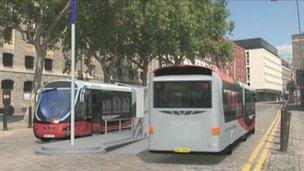Bristol cycling review over Rapid Transport Route concern
- Published

The Rapid Transport Route proposals in Bristol are likely to cost in the region of £200m
Cycling provision in Bristol will be reviewed after a transport charity's founder criticised new bus route plans.
John Grimshaw, founder of Sustrans, said the city should lose its Cycle City status if current proposals for the Rapid Transit Scheme go ahead.
He claimed the plans would split the cycling route "into bits" and the connections would not work.
Bristol City Council said it accepted that additional provision would be of benefit and plans would be reviewed.
'Boost'
Councillor Tim Kent, who is responsible for transport at Bristol City Council, said he had agreed with council officers that some of the cycling provision would be put back in.
"The scheme will bring back in substantial additional cycling provision, including extra bridges and extra cycle ways. It's a real boost for cycling in this city," he said.
"But in looking at the plans we do accept that additional provision would be of benefit to cyclists and what we are trying to do at the moment is identify exactly what we can afford to put back in and where we can find that funding."
Mr Grimshaw, who no longer has any role with the charity, said that Bristol had made a permanent commitment to ensure any new transport scheme would improve things for walking and cycling.
"The original proposals, in 2009, for this bus-way did that quite well.
"But they did 'value engineering' and in my language 'value engineering' is removing everything of value for the community.
"The cycling route has been split into bits, the connections don't work and it's too narrow."
Three schemes serving Bristol will make up the Rapid Transport Route project which is expected to cost in the region of £200m.
That funding will be split across three authorities along with a government contribution of £112m.
The plans are currently under a public consultation and the routes are expected to be operational in 2015.
- Published17 May 2012
- Published9 January 2012
- Published14 December 2011
- Published7 March 2011